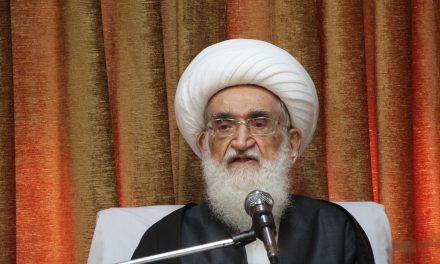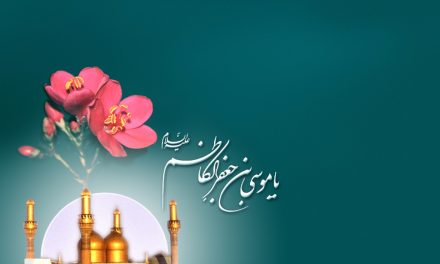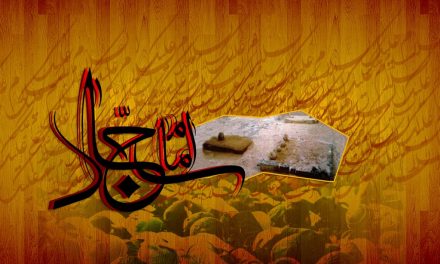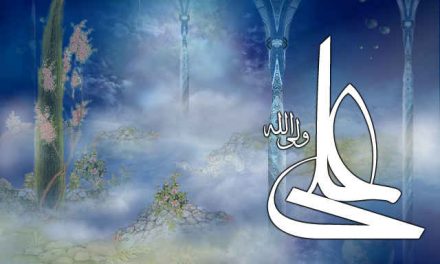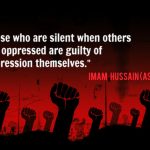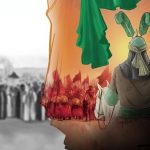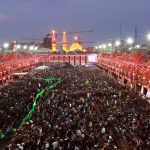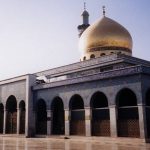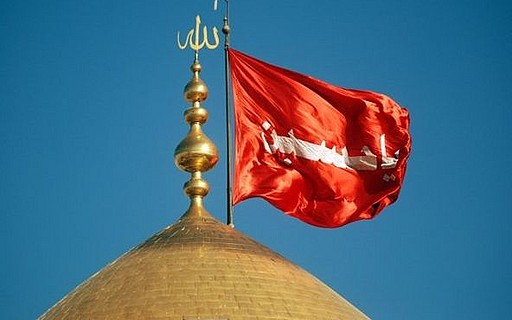
Human history may be seen as a record of the eternal struggle between right and wrong, virtue and vice, good and evil, and righteousness and wickedness. This struggle was decreed by God when Adam, an earthly creature, was sent to earth to engage in this eternal battle. It is through this struggle that human beings can earn their eternal bliss in the Gardens of Paradise, or their eternal punishment in the Fire. In the history of nations this struggle often attains universal significance as that moment of the struggle can speak to all subsequent times and situations. Thus the Qur’an urges us over and over again to ponder the end of those who were before us, and how God dealt with them. In every case, moreover, a prophet or messenger of God was rejected by his people and killed or driven out. In this sense, therefore, the struggle is in the end between God and humankind, between truth and falsehood, and between right guidance and manifest error.
Nowhere is this struggle placed in sharper relief than in the life of the Prophet Muhammad, and the lives of the people of his House. The life and witness of the Imam Husayn (AS) in particular, has acquired special significance in Muslim piety. This is because he has provided a model for all martyrs in the way of God, for all time. The purpose of this paper is to emphasize the universal significance of the Imam in Muslim tradition. It is important to observe that all the traditions cited in this essay are found in both Shi’i and Sunni hadith literature. But while in the Sunni community such traditions remain purely pietistic, Shi’i tradition has made them the basis of a complex theological system.
However, to appreciate the place of Husayn (AS), ‘the prince of martyrs’, in Muslim history, a word must be said about the place of the Prophet’s family (the ahl al-bayt) in Muslim piety. At the same time the people of the House of the Prophet Muhammad are not unique in the prophetic history of human societies. A word is, therefore, necessary concerning the families of other prophets, if we are to appreciate fully the devotion which Muslims throughout their long history have accorded the people of the House of Muhammad, the seal of the prophets.
Prophetic history begins, according to the Qur’an, with Adam, called safwat Allah (the elect of God). He was followed by Noah, the first of the prophets of power or resolve (ulu al-‘azm). Noah was sent as a messenger by God to his people who rebelled against God’s message, and were thus destroyed by the flood. Then came Abraham, the father of prophets. With his son Ishmael he built the Kaaba, the first house for the worship of God. Ishmael was also a prophet, and the ancestor of the prophets Shu’ayb, Salih, Hud, and finally Muhammad, the last messenger of God to humankind.
Isaac, Abraham’s second son, was also a prophet and the father of prophets. Among his descendants were the family of ‘Imran, the father of Moses, and Jesus, as well as other earlier prophets who were sent by God to the Children of Israel. The Qur’an declares that God has elected Adam, Noah, the family of Abraham and the family of ‘Imran. It further states that they were a single progeny, one from the other’. All the prophets and their families are therefore of one physical and spiritual lineage They and their households are the elect of God, purified and honoured over the rest of humankind.
The people of the House of the Prophet Muhammad were likewise chosen by God and purified from all evil and sin. The Muslim community did not, however, infer the status of the family of Muhammad from that of earlier prophets and their families. Rather they too were chosen by God and purified from all evil and sin. Yet because Muhammad was the last prophet sent to guide humanity to God and the good, his descendants could not assume his prophetic role. Their mission was to be the Imams, or guides, of the Muslim community. Their task is to safeguard the message vouchsafed to Muhammad by God for humankind.
Like many prophets, the Imams had to endure rejection by their people and much suffering at their hands; martyrdom in the cause of God was often their lot. Yet the greater the suffering, the greater is the reward and honour which God promises His prophets, friends (awliya’), and righteous servants. Thus the Prophet was asked: ‘Who among men are those afflicted with the greatest calamity?’ He replied: The prophets, then the pious, everyone according to the degree of his piety. A man is afflicted according to his faith (din); if his faith is durable, his affliction is accordingly increased, and if his faith is weak, his affliction is made lighter. Afflictions continue to oppress the worshipful servant until they leave him walking on the face of the earth without any sin cleaving to him.
Excellences of the Ahlul-Bayt
In both Sunni and Shi’i Muslim tradition, one important event symbolizes the status of the Ahlul-Bayt and the human as well as spiritual dimensions of their relation to the Prophet. This is the tradition or episode of al-kisa’ (the mantle, or cloak) which the Prophet spread over himself and Fatima his daughter, ‘Ali, and their two sons Hasan and Husayn (AS). This tradition has come down to us in a number of versions, each stressing one or another aspect of the excellences of the family of the Prophet and his love for them. Ahmad b. Hanbal relates on the authority of Umm Salama, the Prophet’s wife, that he said to Fatima one day: ‘Bring me your husband and two sons.’
When they had all come together he spread over them a mantle, and laying his hand over them, he said: ‘O God, these are the people of the House of Muhammad! Let therefore your prayers and blessings descend upon Muhammad and the people of the House of Muhammad; for you are worthy of all praise and glory.’ Umm Salama continued: ‘I then lifted the mantle to enter in with them, but he pulled it away from my hand saying, “You too shall come to a good end”. The point which this version of the kisa’ tradition emphasizes is that the Ahlul-Bayt are only the five: Muhammad, ‘Ali, Fatima, and their two sons Hasan and Husayn (AS). Umm Salama, one of the most highly venerated of the Prophet’s wives, was denied this special status. We shall have more to say about this point, as it is emphasized in almost every version of this tradition.
In another highly interesting version of the kisa’ tradition, related on the authority of ‘Abd Allah b. Jafar b. Abi Talib, we read: As the Apostle of God saw mercy descending, he demanded: ‘Call them for me, call them for me!’ Safiyya asked: ‘Who should we call, O Messenger of God?’ He answered: ‘Call the people of my household: ‘Ali, Fatima, Hasan, and Husayn (AS).’ When they were brought, he spread a mantle over them; then lifting his hands to heaven said: ‘O God, these are the people of my House; bless, O God, Muhammad and the people of the House of Muhammad!’ God then sent down the verse: Surely God wishes to remove all abomination from you, O People of the House, and purify you with a thorough purification.
Source: al-shia.org

